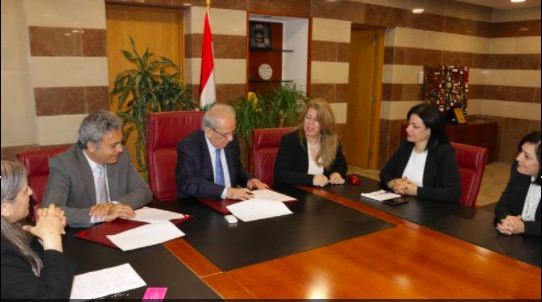EDUCATION FOR PEACE .
An article by Anne-Marie El-Hage for L’Orient le Jour (reproduced by permission of the author)
An agreement signed between Aunohr University and the Ministry of Education plans to develop a culture of peace in the country’s schools.
For the first time in Lebanon, the culture of non-violence will be at the heart of the education system, public and private, classical and technical. Not only will it appear on the menu of the next school programs, as part of the development of these programs, from kindergarten to secondary classes, but the entire education system should be impregnated, teaching, management of schools, school life, playgrounds, school transportation, the relationship between students, that between students and teachers …

Signature of the agreement on the development of the culture of non-violence in schools. Aunohr photo.
Click on photo to enlarge
This is promised by the Memorandum of Understanding between the Ministry of Education and Academic University For Non-Violence & Human Rights – Aunohr. An agreement was signed on May 15 between the two parties, represented on the state side by Minister Marwan Hamadé, sponsor of the event, and by the president of the Center for Educational Research and Development (CRDP), Nada Oweijane, and on the academic side, by Aunohr’s founder, Ogarit Younan, and by university president, Issam Mansour.
(continued in right column)
(Click here for the original version of this article in French)
Peace Studies in School Curricula, What would it take to make it happen around the world?
(continued from left column)
The initiative aims to “institutionalize non-violent culture,” says Ogarit Younan, to involve the State, in all its components, from the Ministry of Education and the CRDP. Because, she notes, “the needs are pressing at this level, given the increase in violence among young people and even among children.” This explains why Aunohr University is often asked by schools across the country to train their teachers in the culture of non-violence or to organize activities in this direction for students. “After the application of our methods, the results are palpable,” observes Younan, noting that children are quieter, that the educational life becomes easier. This prompted the Minister of Education, Marwan Hamadé, to say, after the signing of the agreement, that it is “one of the most beautiful agreements signed by the Ministry of Education. ‘Education and Higher Education’. And this in a desire to highlight the crucial nature of the culture of non-violence for Lebanon.
Establishing peace begins in childhood
The starting point of this mutual initiative lies in the Declaration of the Rights of the Child and the Universal Declaration of Human Rights. As a signatory to these two declarations, Lebanon faces another major challenge set by the United Nations, that of spreading a culture of peace and non-violence in the world, as part of the United Nations Program of Action for the Decade. 2001-2010. “Changing people’s minds, building peace, must start in schools and from childhood,” says Younan. To do this, the university (which obtained its license in 2014) has already developed complete curricula. It must now develop the appropriate teaching material, but also train the trainers who will go on the ground. Because the culture of non-violence goes through different learning, namely the management of anger, listening, the development of peaceful memory, the construction of the true self, the understanding of conflicts in relation to others, the language not violent, and many other things.
This is certainly not the first time that the concept of non-violence is privileged within the Lebanese institutions. In 1997, Ogarit Younan was already a civil society consultant to introduce this principle into school curricula. “But just a few chapters have been changed,” she notes, adding that at the time, “it was a first step”. Much later, on October 13, 2016, the Council of Ministers dedicated October 2 of every year as the national day for the culture of non-violence. With the signing of the new agreement, the hope of growing up in a non-violent environment is now at hand for the children of Lebanon. Provided, of course, that the initiative is put into practice.
(Thank you to Phyllis Kotite, the CPNN reporter for this article.)